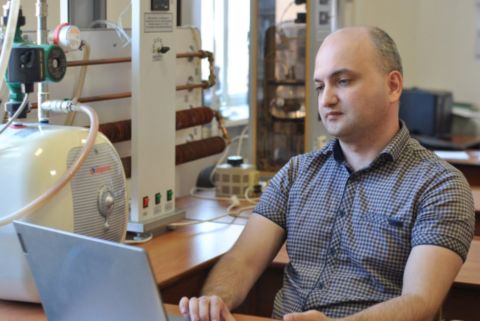A project by SUSU scientists to develop the mechanical elements of blades for uninterrupted operation of wind turbines and quadcopters was supported by a grant from the Russian Science Foundation. This will increase the efficiency of quadcopter battery utilization and reduce the cost of wind turbines for emergency shutdown and restart. The neural network being developed on the basis of a control system is designed to fine-tune the operation of the upgraded equipment.
Researchers from the SUSU Department of Industrial Thermal Power Engineering have come up with an idea to equip the blades of horizontal wind generators with mechanical elements similar to those found in aircrafts, which will increase the efficiency of wind power plants. With these elements, the blade will be less susceptible to deformation, and the wind turbine will be less likely to stop in high wind speeds. The cost of "strong" wind turbines (more than 2 kW) is over 100 thousand roubles.
These mechanical elements will help avoid complete shutdown of the wind farm. Instead, the blades will slow down to safe speeds. Continuous operation of the wind turbine will prevent power supply failure and will eliminate the need for a backup power source. In addition, the developed mechanical element can be used to, among other things, improve the operational capabilities of civilian quadcopters, which are used for maintenance of power and heating networks, and agricultural needs, such as cadastral works.
The ability to adjust the angle of the quadcopter's blades during takeoff and landing will reduce the amount of power consumed by the battery. Battery power will also be saved because the operator can turn parts of the blade up and down, left and right. Another advantage in this area of research is that the trajectory of the quadcopter will become more stable, and the probability of the device toppling over will be minimized.
Within this grant, scientists are also developing a neural network that will support higher quality operation of wind turbines and quadcopters. Neural networks are needed in industrial applications to collect data on operator errors and control systems that need to be avoided in the future.
"Our number one task is to develop blades with mechanical elements; our number two task is to develop a neural network to control this. The program will keep track of all kinds of operational errors and prevent them from happening in the future. For wind turbines this will be a fully automated system without human involvement, and for drones this will be a self-training network with human involvement," shared Konstantin Osintsev, Candidate of Sciences in Engineering, Associate Professor, Head of the Department of Industrial Thermal Power Engineering.
The network will be able to correct the movement of the quadcopter, minimizing the influence of the human factor. This guarantees the lowest probability of negative outcomes.
"Let's simulate the situation: a quadcopter was in a stable position, but at some point it begins to fall. The operator adjusts the position of the quadcopter, trying to return it to its previous trajectory. At the same time, the network remembers the operator's mistakes and later at a later point, when the operator tries to perform a correction, the quadcopter adjusts its final decision. If the neural network algorithm will be able to correct all errors in its forecasts, then implementing this development will show promise," says the scientist.
The SUSU researchers are planning to create quadcopter and wind turbine models on a 3D printer capable of casting plastic materials. The quadcopter will be recreated in real size, and the blades of the wind turbine will be printed at a reduced scale.
SUSU scientists will conduct their research on the efficiency of blades equipped with mechanical elements in an aerodynamic stand. The aerodynamic stand will be purchased specifically for this project. In the aerodynamic stand, the blades are subjected to high-speed air flows. By looking at the directions of the current lines, the researchers will learn the trajectory of the air flow depending on the position of the mechanical elements. They can then come to conclusions on the optimal design.
The Russian Science Foundation has allocated 6.9 million roubles for the development of this study within a 3-year project.
South Ural State University is a university of transformations, where innovative research is conducted in most of the priority fields of science and technology development. In accordance with the strategy of scientific and technological development of the Russian Federation, the university is focused on the development of big scientific interdisciplinary projects in the field of digital industry, materials science, and ecology. In 2021 SUSU became the winner in the competition under the Priority 2030 program. The university acts as a regional project office of the World-class Ural Interregional Research and Education Centre (UIREC), which is aimed at solving the tasks of the Science and Universities National Project.




